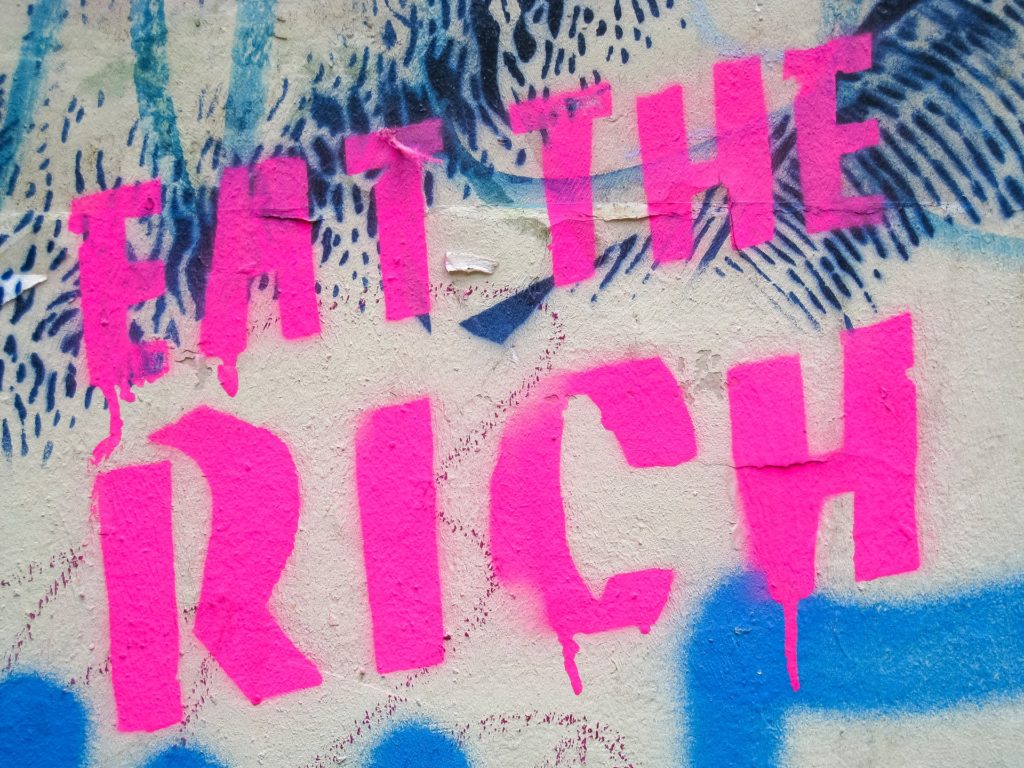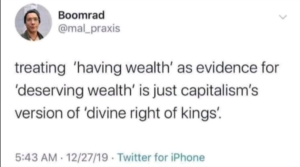In 2021, while people were dying because they could not afford to meet basic needs like vaccines, food or shelter, three of the world’s richest men were dabbling in space travel. Since the pandemic began, millions have lost their livelihoods as whole industries were forced to grind to a halt. At the same time, the world’s richest ten men have doubled their wealth. Inequality has reached absurd levels and a new Oxfam report highlights some of the most shocking disparities.
‘Inequality Kills”, Oxfam report
Leading global NGO, Oxfam has just released another hard-hitting report documenting just how unequal our world has become. The report not only emphasises inequality but also directly names Capitalism as a root cause. You know the tide is turning when a household name organisation is speaking out about Capitalism run amok. The researchers say that inequality levels are a result of policy and that wealth hoarding by the uber-rich is “economic violence”. So, what did the research find?
“Over the past two years, people have died when they contracted an infectious disease because they did not get vaccines in time, even though those vaccines could have been more widely produced and distributed if the technology had been shared. They have died because they did not get essential hospital care or oxygen when they needed it, because of shortages in underfunded public health systems….They have died of hunger because they could not afford to buy food. They have died because their governments could not or would not provide the social protection essential to survive the crisis. And while they died, the richest people in the world got richer than ever and some of the largest companies made unprecedented profits….Now it appears that inequality is not just killing those with less political voice; it is also killing the planet” – Jayati Ghosh, Professor of Economics at the University of Massachusetts and member of the World Health Organisation’s Council on the Economics of Health For All.
During the pandemic, the rich got richer. Much richer.
A new billionaire was created every 26 hours since the pandemic began. And at the top of that, the multi-multi billionaires who occupy “richest people alive” territory saw their net worth soar to incomprehensible highs. The 10 richest people men saw their collective wealth rise by $540bn. Tesla founder Elon Musk made a staggering $1.3 billion per day, pushing him above Jeff Bezos to become the richest person in the world with a net worth of in excess of $220bn.
It’s difficult to grasp the full extent of wealth like that. Huge numbers are rendered almost meaningless without context. This data visualisation shows just how mind-blowingly wealthy people like Musk and Bezos are. For example, if the 10 richest men spent a million dollars each a day, it would take them 414 years to spend their combined wealth, Oxfam reports. Hoarding more wealth that you can spend, even in many lifetimes, while the majority of people’s lives are becoming more difficult is unconscionable.
Capitalism is built on ideas about the virtue of hard work, about individualism. We have been conditioned to believe that it’s everyone for themselves and those who manage to amass vast wealth have somehow “earned” it. That they must be of superior intelligence and lauded for their work ethic. But, there is nothing ethical about extreme wealth.
The other side of the coin
According to Oxfam, the pandemic has pushed around 160 million people into poverty, devastating families. Millions lost their jobs or businesses. The top 1% of the population now has 19 times more global wealth growth than the bottom 50%. As the report says, “Inequality is now as great as it was at the pinnacle of Western imperialism in the early 20th century.”
But, what does this increase in poverty mean for people who experience it? Oxfam report that inequality contributes to the death of at least one person every four seconds. Simply put, the issues that stem from economic disadvantage are cutting lives short all over the world. Hunger kills over 2.1 million people every year. And yet, we waste almost a third of all food produced annually. Our systems operate only to protect wealth and profit, rather than people of the planet.
Predictably, people who are already marginalised in some way are feeling the brunt of this growing economic inequality. Globally, women lost $800bn in earnings in 2020. And while employment rates among men are now beginning to recover, fewer women are expected to have been in employment in 2021 compared with 2019. This is partly due to additionally caring responsibilities, which disproportionally falls to women. Extended breaks in employment result in fewer retirement savings or falling behind in skills and experience and the consequences can be lifelong. In many instances, it can lead to women remaining in abusive relationships because of economic dependency on a partner.
Additionally, Oxfam discloses that over 20 million girls are at risk of never returning to school, having dropped out to support their families. Many will have been forced into labour or, even worse, child marriage. People have fought hard for decades for gender equality and for education for women and girls and much of that work is beginning to unravel as a result of the pandemic and ensuing economic crisis.
We know that the groups who suffered disproportionately due to COVID are the same groups who will suffer the first and most intense effects of climate change. In fact, Oxfam estimates that by 2030 the climate crisis could kill 231,000 people each year in poor countries.
A game of monopoly
A tiny minority of people hold most of the world’s wealth and subsequently, they hold most of the power. The 10 richest men in the world now own more than the bottom 3.1 billion people combined. That’s just 10 men with more capital than over than a third of the earth’s population.
Billionaires often accumulate their huge fortunes not so much from hard work but through exploiting workers, avoiding tax and securing enough capital to become major players in the investment world. Through investments in businesses, property and the stock market, the super-rich are able to quickly multiply their money.
Often, they run or own huge powerful companies that are able to buy other companies to become conglomerates. Pepsi Co. owns a plethora of well-known food and beverage brands like Lipton and Doritos. Nestle, Unilever and Mondelez operate similar business models. In fact, most brands you would recognise in a supermarket are likely to belong to a small number of parent companies that dominate the industry. Investing in these monopolies are a small number of mega-wealthy shareholders who use their positions to influence decision-making. Even businesses that appear to be competitors can ultimately be owned and controlled at the very top level by the same small group of investors.
Billionaires leverage this power and influence to lobby governments, take advantage of legal and tax loopholes and stockpile more assets. People everywhere are tired of their governments insisting that there is no “magic money tree“. That there is no money to adequately fund the things they care about; affordable healthcare systems, accessible spaces and social care for people with disabilities or clean public transport. But the money is there, it’s just being funnelled to an increasingly small number of people who then applaud themselves for “giving back” to address inequality in the form of billionaire philanthropy. Philanthropy which they control therefore deciding what should be funded based on their own interests and values rather than collectively decided priorities.
Luxury carbon footprints
Billionaire status goes hand in hand with lavish lifestyles. Ostentatious displays of wealth like super-yachts, private jets, sports car collections and private islands are commonplace amongst the 1%. Not exactly well aligned with tackling greenhouse gas emissions and stabilising the climate. In fact, another recent report published by Oxfam, “Carbon inequality in 2030” calculated that twenty of the richest billionaires are estimated to be emitting as much as 8,000 times more carbon than the billion poorest people. Extreme economic inequality, it appears, comes hand in hand with carbon inequality.
In 2015 world leaders agreed to limit global warming to under 2° and, if possible under 1.5°. While .5° may sound diminutive, the difference in these scenarios is consequential. The difference is life and death for people, especially in the Global South and climate justice activists have been fighting hard to keep 1.5° alive as governments continue to delay climate action on the scale it is needed. If emissions of the wealthy and powerful are allowed to go unchecked, we are condemning millions of people around the world to suffer. On one side, you have a small population pursuing increasingly luxurious lifestyles, and on the other, you have billions of people fighting for climate action so that they can simply live.
“Over the past 25 years, the richest 10% of the global population has been responsible for more than half of all carbon emissions… Rank injustice and inequality on this scale is a cancer. If we don’t act now, this century may be our last.” Antonio Guterres, UN Secretary-General.
In a time when scientists are urging governments to take emergency action to rapidly reduce emissions, newly-minted billionaires securing their place in the top echelons of society and adopting the lifestyle to go with it is a deadly trend for humanity. While a growing number of concerned citizens is pledging to quit flying to reduce their personal emissions, the 1% are using private jets as though the climate crisis is non-existent.
Energy crisis
Europe is deep in an energy crisis as gas prices skyrocket and looks set to exacerbate inequality even further. In the UK, people are due to see their bill increase by a steep 54% in April. Despite being one of the wealthiest economies in the world, millions already live in fuel poverty and are faced with having to choose between “eating and heating” during the winter months. The rising prices are likely to drive many more into this category. Moreover, this is part of a much wider cost of living crisis as inflation has reached a high of at least 7% since last year driving the up prices of daily essentials leaving many just barely able to make ends meet.
All the while, fossil fuel organisations received $11m a minute in subsidies in 2021. This is making some of the world’s richest people even richer. Earlier this year, oil majors BP and Shell announced records profits in 2021. CEO of Shell, Ben van Beurden, took to Twitter to share his delight in creating “value for shareholders”. He himself has netted a reported £70million since taking on the leadership role in 2014.
Clawbacks
It is imperative we start to claw back extreme wealth to reduce not only inequality but also emissions from ultra high carbon lifestyles. This can be achieved through progressive taxation like, for example, a “windfall tax.” Amid the UK energy crisis, NGOs are calling on the Chancellor, Rishi Sunak, to implement a tax on fossil fuel companies to “make polluters pay” for rising energy costs, rather than ordinary people having to foot the bill.
This is a view shared by Oxfam, who propose taxation as an effective solution to addressing inequality more broadly. They are calling for a one-off tax on the wealthiest people, to generate a pool of funds we can then use to address the inequality gap widened by the pandemic. Their report states that a “99% emergency tax on new, pandemic-era billionaire wealth of just the top 10 richest men alone would raise $812bn.” This could be used, they propose, to pay for vaccines in countries where people have yet to access them as well as being funnelled into better social protections and climate measures.
In addition to a one-off emergency tax, Oxfam is calling on world governments to rethink their entire tax systems and implement fairer tariffs on wealth as well as income. The funds collected should then be redistributed for essential public services like healthcare, social care, basic income, gender equality and climate action, including damage and loss payments.
Of course, this is likely to be met with resistance. In an interview, Elon Musk expressed his opinion that “You want those who are managing capital to be good stewards of capital. And I think the government is inherently not a good steward of capital.” But why should any minority be the stewards of capital? Governments are certainly not perfect but in a democracy, they are elected. They win their seats, and they can lose them if voters are unhappy. Billionaires are not elected by anyone and we cannot unseat them if we deem their philanthropy or investments ineffective or worse, damaging. Musk prefers to spend his billions on cars, real estate and of course, space travel. An 11-minute flight into space emits 75 tonnes of CO2 per passenger. That’s more than the average citizen in the UK emits in a 5 to 15 year period (depending on the source and calculation). Even with a 99% tax, Musk would still be extremely wealthy.
Living a 1.5° lifestyle
If we have any chance of limiting warming to 1.5°, we have to start cultivating lifestyles that are compatible with much lower carbon emissions. Luxury products like skincare, clothing and experiences like spa days and vacations bring undeniable pleasure. But pleasure cannot sustain us. Pleasure is fleeting; it does not bring contentment. In order to halt climate change and restore some balance, we have to collectively reject overconsumption. True contentment lies in the universally enjoyed “small things” in life. Spending time in the company of those you love, doing the activities you enjoy, finding purpose in the work you do.
“Wealthy people set the tone on consumption to which everybody aspires. That’s where the toxic effects are,” shares Halina Szeinwald Brown, environmental scientist. And, the advertising industry is complicit. As Harriet Kingaby once said, “advertisers are the architects of desire”. Every day, media outlets bombard us with thousands of ads. Advertising is ubiquitous and it is designed to make us feel inadequate and as though happiness is just a few clicks away. This is further fuelled by influencer culture, which showcases extravagant lifestyles to aspire to. In order to live lower carbon lives, we need to learn how to self-regulate our behaviour, particularly our impulse to spend, for the collective good. We already know that buying less is good for the planet. It’s also good for our wallets and our well-being.
Over at popular eco-friendly blog, Treehugger, the writers have been discussing how to live a lifestyle compatible with 1.5 of warming. Lloyd Alter has even published a book on how to achieve it. Alter is the first to admit that being in a position to reduce your carbon emissions to just 2.5 tonnes per year is the result of many layers of privilege. However, it does provide rich inspiration for those of us who want to reduce our own impact.
Environmentalist, Rosaline Readhead, took it a step further and spent a year attempting to only produce 1 tonne in a year. Readhead did point out that what we have already mentioned – the richest 10% of the world’s population emits half of the CO2. She believes that this is why it is so significant for the affluent to make changes; they can afford to, and they can have a big impact. But this will require a shift in both mindset and values. “We have normalized overconsumption. That hyper-normalization of hyper-consumption has eaten away at our core human values. And what makes us happy. This means the pathway to net carbon zero is also a cultural metamorphosis.”, Readhead shares.




